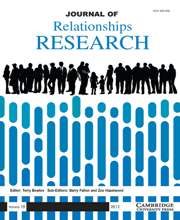Article contents
Caregiver Burden and Relationship Satisfaction in ASD-NT Relationships
Published online by Cambridge University Press: 01 October 2020
Abstract
While some people with autism spectrum disorder (ASD) are unable to live independent lives, others can, and they often develop romantic relationships. Couplings where one partner has ASD and the other does not (ASD-neurotypical [NT] relationships) were the focus of this mixed-methods study. Relationship satisfaction was lower among NT participants than those with ASD. Caregiver burden was comparatively high and negatively related to relationship satisfaction. Key themes identified in the qualitative analysis include caregiver burden, loneliness, and self-care within ASD-NT relationships. These findings have clinical implications for helping professionals and people engaged in ASD-NT relationships, and highlight the need for support to assist these couplings maintain satisfying relationships.
Information
- Type
- Research Article
- Information
- Copyright
- Copyright © The Author(s), 2020. Published by Cambridge University Press
References
- 2
- Cited by

